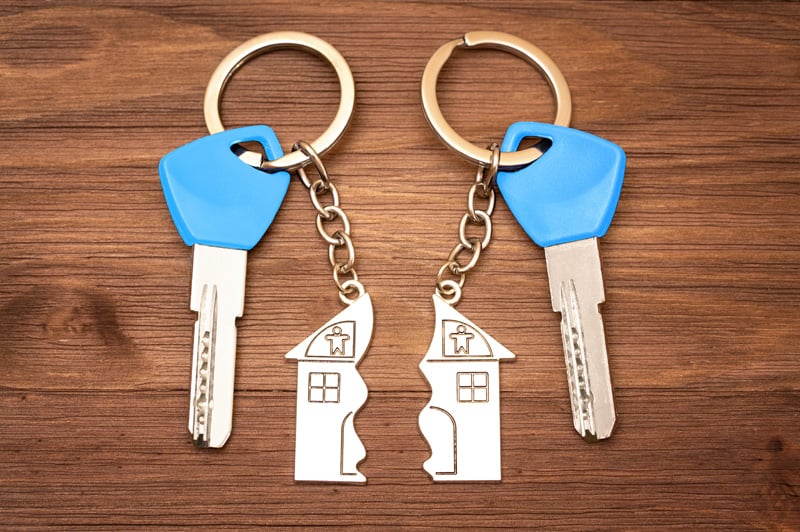
Home Financing Through Divorce: The Complete Guide
Going through a divorce? Learn how to handle your mortgage, refinance, buy out your ex, qualify with alimony, and avoid costly mistakes.
Going through a divorce represents one of life's most challenging transitions—emotionally, legally, and financially. Among the most significant decisions you'll face is what to do with your shared home and mortgage.
This comprehensive guide addresses the critical questions about mortgages and home financing during divorce.
Whether you're considering keeping the family home, refinancing to remove your ex-spouse, exploring divorce mortgage options, or starting fresh with a new purchase, you'll find practical guidance based on decades of mortgage experience helping individuals navigate this difficult transition.
In this resource guide, you'll learn:
- How divorce affects your mortgage responsibilities and options
- Step-by-step guidance for refinancing after divorce
- How to calculate and execute a home equity buyout during divorce
- Ways to use alimony and child support for mortgage qualification
- First-time homebuyer opportunities that may be available after divorce
- Common mortgage mistakes to avoid during the divorce process
- Expert tips for protecting your financial future
Understanding Your Divorce Mortgage Options
When going through a divorce, you have several options regarding your home and mortgage. Each comes with distinct advantages, challenges, and long-term implications that affect both your emotional wellbeing and financial health.
Balancing Emotional and Financial Considerations
Before diving into specific mortgage options, it's important to acknowledge that housing decisions during divorce involve both emotional and financial components:
Emotional Considerations:
- The family home often symbolizes stability, memories, and identity
- Staying may provide continuity for children during a difficult transition
- A fresh environment might support emotional healing for some individuals
- Familiar surroundings may offer comfort during a turbulent time
Financial Realities:
- Post-divorce income is typically lower while expenses remain similar
- Maintaining a home alone requires sufficient income and savings
- Your financial security shouldn't be sacrificed for emotional attachment
- Long-term stability often depends on making financially sound decisions
Ask yourself: Does keeping the home help you move forward, or keep you anchored to the past? Would the financial strain of keeping the home create new stresses that outweigh the emotional benefits?
The right decision balances both emotional and practical factors—and may change over time as you move through the divorce process.
Joint Mortgage Responsibility After Divorce
A critical fact that surprises many divorcing couples: Your divorce decree doesn't override your mortgage contract.
Even if your divorce agreement states that one spouse is responsible for the mortgage payments, the lender still considers both parties legally responsible if both names remain on the loan.
This creates significant risk, as:
- Both parties' credit scores are affected by payment history
- The mortgage debt counts against both parties' debt-to-income ratios for future loans
- Both remain liable for the full loan amount regardless of the divorce agreement
Primary Divorce Mortgage Options
Most divorcing couples choose one of these three paths:
|
Option |
What It Means |
Key Benefits |
Main Challenges |
|
Sell the Home |
Both spouses sell the property and split proceeds |
Clean financial break; Funds for separate housing; Eliminates ongoing entanglement |
Timing sale with divorce; Potential market timing issues; Finding new housing |
|
One Spouse Keeps Home |
One spouse refinances to remove the other and keeps the property |
Stability for children; Familiar environment; Potential investment growth |
Qualifying solo; Equity buyout required; Maintenance responsibility |
|
Temporary Joint Ownership |
Continue co-owning for a defined period |
Delays tough decisions; Short-term stability; Can align with life events (children's graduation, etc.) |
Both remain liable; Requires detailed written agreement; Ongoing communication needed |
Which Divorce Mortgage Option Is Right for You?
Consider these key questions when deciding:
- Financial reality: Can either spouse truly afford the home independently?
- Emotional factors: Would a fresh start be more beneficial than keeping the marital home?
- Children's needs: How would a move affect their schooling and emotional well-being?
- Market conditions: Is it a good time to sell in your area?
- Future flexibility: How might your housing needs change in the coming years?

Financial Considerations When Deciding to Keep or Sell
Assessing Affordability as a Single Homeowner
Before deciding to keep your home, conduct a thorough financial assessment:
- Create a post-divorce budget that accounts for all income sources and expenses
- Calculate total housing costs, including:
- Mortgage payment
- Property taxes
- Homeowners insurance
- Utilities
- Routine maintenance (typically 1-2% of home value annually)
- Major repairs and replacements (roof, HVAC, etc.)
- Apply the 28/36 rule: Housing costs should ideally not exceed 28% of your gross income, and total debt payments should remain under 36%
- Consider future changes to income or expenses (career changes, children leaving home, etc.)
Be honest about whether keeping the home is financially sustainable. Many people stretch themselves too thin trying to maintain the marital home, only to face financial stress or even foreclosure later.
📊 Wondering if you can truly afford to keep the home? Let’s review your numbers together.
Get Personalized Insight →Calculating Home Equity Buyout During Divorce
If one spouse plans to keep the home, an equity buyout is typically required. This process involves:
- Determining current market value through a professional appraisal
- Calculating total equity: Home value minus mortgage balance and any liens
- Dividing equity according to your divorce agreement (often 50/50, but varies by state and circumstances)
Example calculation:
- Home value: $400,000
- Remaining mortgage: $250,000
- Total equity: $150,000
- Equal division: $75,000 to each spouse
The spouse keeping the home would typically need to refinance for enough to pay off the existing mortgage plus the departing spouse's equity share ($325,000 in this example).
For a detailed explanation of the home equity buyout process during divorce, see our guide "How to Buy Out Your Ex-Spouse's Share of the Family Home"
Tax Implications of Different Decisions
Your home-related decisions during divorce carry significant tax consequences:
- Selling before divorce is final: Married couples can exclude up to $500,000 in capital gains from the sale of a primary residence
- Selling after divorce: Single individuals can only exclude up to $250,000
- Keeping the home: Only the owner can claim mortgage interest and property tax deductions
Legal Consideration:
Tax laws can change, and individual circumstances vary greatly. Always consult with a tax professional about your specific situation.
Financial Impact:
These tax differences can amount to tens of thousands of dollars, making timing an important consideration in your overall strategy.
How to Refinance After Divorce: A Step-by-Step Guide
Refinancing is typically the cleanest way to remove an ex-spouse from a mortgage while allowing one party to keep the home.
Qualification Requirements for Refinancing After Divorce
To refinance after divorce, the spouse keeping the home must qualify based solely on their own financial profile:
- Credit score: Typically minimum 620 for conventional loans; 580 for FHA
- Debt-to-income ratio: Generally below 43%, though some programs allow up to 50%
- Income stability: Verifiable income sufficient to cover the new loan amount
- Home equity: Typically need at least 3-5% equity for rate-and-term refinances; 20% for cash-out refinances
How Divorce Affects Mortgage Qualification
Divorce impacts several qualification factors:
- Income changes: Loss of second income may be partially offset by alimony/child support
- Credit score impacts: Joint accounts, missed payments during separation, or increased credit utilization may affect scores
- Debt-to-income ratio shifts: Support payments (both paying and receiving) affect DTI calculations
Documentation Needed for Refinancing After Divorce
Beyond standard refinancing documents, you'll need:
- Divorce decree or settlement agreement detailing property division
- Quitclaim deed (if already executed)
- Support payment documentation if using for income qualification
- Separation agreement (if divorce isn't finalized)
- Bank statements showing consistent receipt of support payments
Refinance Options After Divorce
Several refinancing approaches exist, each with distinct advantages:
Cash-Out Refinance for Equity Buyouts
- Creates a new loan larger than current mortgage
- Provides cash at closing for ex-spouse equity payment
- Typically limited to 80% of home value
- Often carries slightly higher interest rates
Rate-and-Term Refinance
- Better option when you have separate funds for the equity buyout
- Typically offers better rates than cash-out options
- May allow higher loan-to-value ratios
Government Loan Options
- FHA loans offer more flexible credit requirements
- VA loans may be assumable under certain conditions
- USDA loans available in rural/suburban areas
Timeline Expectations for Divorce Refinancing
A typical post-divorce refinance takes 30-45 days from application to closing, including:
- Application submission: 1 day
- Initial disclosure review: 3-5 days
- Document collection and verification: 1-2 weeks
- Underwriting: 1-2 weeks
- Conditional approval and clearing conditions: 1 week
- Final approval: 1-2 days
- Closing preparation: 3-5 days
- Closing: 1 day
Common Refinancing Challenges and Solutions
Challenge: Insufficient Income
- Solution: Include alimony/child support with proper documentation
- Alternative: Explore co-signers or co-borrowers
Challenge: Credit Score Issues
- Solution: Focus on improving score through on-time payments
- Alternative: Consider FHA loans with lower credit requirements
Challenge: Insufficient Equity
- Solution: Explore special divorce-related programs like Fannie Mae's equity buyout option
- Alternative: Consider alternative buyout structures or delayed buyout
Challenge: Appraisal Lower Than Expected
- Solution: Contest the appraisal with additional property information
- Alternative: Renegotiate the buyout amount or consider a different valuation method
💬 Unsure what’s next? Chat confidentially with a mortgage expert who understands divorce-related home financing.
Start Your Conversation →Want more details on refinancing after divorce?
Read our complete guide "Refinancing After Divorce: A Step-by-Step Guide"
Home Equity Buyout During Divorce: The Complete Process
If you're keeping the home after divorce, you'll likely need to buy out your ex-spouse's share of the equity.
Determining Fair Market Value for Divorce Buyouts
The foundation of any successful buyout starts with an accurate home valuation:
- Professional appraisal: The most objective assessment, typically costing $300-600
- Comparative market analysis: Performed by real estate agents, often at no cost
- Multiple valuation approaches: Some couples obtain several valuations and average the results
- Court-appointed appraisers: In contentious situations, the court may select an independent appraiser
Equity Calculation Methods for Divorce
The basic equity calculation formula is: Total Equity = Current Home Value - Outstanding Mortgage Balance - Liens
This calculation can be complicated by factors such as:
- Home improvements made during the marriage
- Separate property contributions to the original down payment
- Deferred maintenance that might reduce practical equity
- Second mortgages or HELOCs that reduce available equity
Financing Options for Home Equity Buyouts During Divorce
Several approaches can fund a home equity buyout:
Cash-Out Refinancing
- Most common approach
- New mortgage is larger than the current loan
- The difference provides cash for the buyout
- Limited to 80% of the home value typically
Rate/Term Refinance with Equity Buyout
- Lower interest rates than cash-out refinances
- Higher loan-to-value ratio potential (up to 95%)
- Requires specific language in the divorce decree
- More flexible qualification criteria
Home Equity Loans & HELOCs
- Second mortgage or line of credit
- Preserves favorable terms on the primary mortgage
- Typically available up to 85-90% combined loan-to-value
- Useful when your existing mortgage has a favorable rate
Alternative Solutions
- Deferred buyout with formal agreement
- Payment plan directly to ex-spouse
- Asset trading (retirement accounts, investments, etc.)
Legal Considerations in the Divorce Buyout Process
The buyout process involves important legal steps that differ from financial considerations:
Legal: Structuring the Divorce Decree
- Must explicitly identify the property (address and legal description)
- Should specify exact buyout amount (dollar figure, not just percentage)
- Needs a reasonable timeframe for completing the buyout
- Should include contingency plans if refinancing isn't approved
Financial: Funding the Buyout
- Determining the most cost-effective financing method
- Calculating total costs including interest over time
- Establishing payment schedules and terms
- Considering the tax implications of different funding methods
Legal: Title Transfer Process
- Quitclaim Deed: Most common method, where one spouse signs away rights
- Warranty Deed: Provides greater protection but less common in divorce
- Interspousal Transfer Deed: Used in some states with tax benefits
- Must be properly executed, notarized, and recorded with county
Financial: Mortgage Responsibility Transfer
- Separate from legal title transfer
- Requires lender approval through refinancing or assumption
- Has long-term credit implications for both parties
- Impacts future borrowing ability
Need more information on home equity buyouts during divorce?
Read our comprehensive guide "How to Buy Out Your Ex-Spouse's Share of the Family Home"

Using Support Payments to Qualify for a Mortgage After Divorce
Alimony and child support can significantly impact your ability to qualify for a mortgage after divorce.
How Lenders View Alimony and Child Support for Mortgage Qualification
Support payments affect mortgage qualification in two primary ways:
For Those Receiving Support:
- Can count as income when properly documented
- May be "grossed up" by 15-25% if non-taxable (for post-2018 divorces)
- Must meet continuance requirements
For Those Paying Support:
- Counted as monthly debt obligations, increasing DTI ratio
- May alternatively be subtracted from income (depends on loan type)
- Can significantly reduce borrowing power
Documentation Requirements for Support Payments
To use support payments as qualifying income, you'll typically need:
- Court-ordered divorce decree or separation agreement
- Proof of receipt for at least 6 months (12 months for some loans)
- Evidence that payments will continue for at least 3 years
- Bank statements showing consistent, separate deposits
Income vs. Debt Considerations with Support Payments
Your debt-to-income (DTI) ratio is crucial for mortgage qualification:
- Alimony or child support received can increase your qualifying income
- Alimony or child support paid is counted as a monthly debt obligation and can reduce your borrowing power
- Fannie Mae offers flexibility in how alimony payments are treated
- Freddie Mac requires alimony to be deducted from gross income
Alternative Qualifying Strategies After Divorce
When support payments aren't sufficient for qualification, consider:
- Co-borrower options: Family members or new partners can strengthen applications
- Asset depletion loans: Convert substantial assets into calculated income
- Additional income sources: Part-time work, rental income, investment dividends
- Strategic timing: Wait for established payment history and credit rebuilding

First-Time Homebuyer Benefits After Divorce
Many divorced individuals are surprised to learn they may qualify as first-time homebuyers, opening doors to valuable programs and benefits.
First-Time Homebuyer Qualification for Divorced Individuals
Under HUD guidelines, you may qualify as a first-time homebuyer if:
- You haven't owned a primary residence in the past three years
- You were a single parent who only owned a home with your former spouse
- You're a "displaced homemaker" re-entering the workforce after divorce
- You only owned property not permanently affixed to a foundation
Available Programs for First-Time Homebuyers After Divorce
First-time homebuyer status provides access to numerous beneficial programs:
Federal Loan Programs
- FHA Loans: Down payments as low as 3.5%, flexible credit requirements
- VA Loans: Zero down payment for eligible veterans
- USDA Loans: No down payment for properties in qualifying areas
State & Local Programs
- State Housing Finance Agency programs
- County and city initiatives
- Location-specific down payment assistance
Financial Advantages
- Lower down payment requirements (as low as 3%)
- Potentially reduced mortgage insurance premiums
- Access to homebuyer education resources
Down Payment Assistance for First-Time Buyers After Divorce
First-time buyers can access various forms of down payment help:
- Grants (no repayment required)
- Forgivable loans (forgiven after a set time period)
- Deferred payment loans (due when home is sold)
- Matched savings programs
- Tax credits for mortgage interest
Application Strategies for First-Time Homebuyers After Divorce
To maximize your chances of approval:
- Check your first-time buyer eligibility through multiple program definitions
- Gather documentation proving your homeownership history
- Complete any required homebuyer education courses
- Compare multiple loan programs and assistance options
- Work with lenders experienced with post-divorce situations
Wondering if you qualify for first-time homebuyer benefits after divorce?
Read our detailed guide "Divorced? You May Qualify as a First-Time Homebuyer"

Rent vs. Buy: Housing Options After Divorce
The rent-vs-buy decision takes on new dimensions after divorce, with both financial and emotional factors at play.
Short-Term vs. Long-Term Housing Considerations After Divorce
Short-term benefits of renting:
- Lower upfront costs during financial transition
- Flexibility to relocate as life circumstances change
- Time to rebuild credit and savings
- Simplified living with fewer maintenance responsibilities
Long-term benefits of buying:
- Building equity with each payment
- Potential tax advantages
- Stability for children
- Protection against rising housing costs
Financial Comparison of Renting vs. Buying After Divorce
|
Factor |
Renting |
Buying |
|
Initial Costs |
First/last month's rent, security deposit |
Down payment, closing costs |
|
Monthly Expenses |
Rent (may increase annually) |
Mortgage, taxes, insurance, maintenance |
|
Tax Benefits |
None |
Potential mortgage interest and property tax deductions |
|
Wealth Building |
None |
Equity accumulation, potential appreciation |
|
Exit Costs |
Minimal |
Transaction costs (typically 6-10% of sale price) |
Emotional and Practical Housing Factors After Divorce
Beyond finances, consider:
- How important is stability during this transition?
- Would homeownership add stress during an already challenging time?
- How might your housing needs change in the next few years?
- Do you have the time and energy for home maintenance?
- Would a fresh start in a new environment be beneficial?
Decision-Making Framework for Housing After Divorce
For most people, the best approach is:
- Assess your current situation: Financial, emotional, and practical needs
- Consider your timeline: How long do you plan to stay in the area?
- Create a realistic budget: For both renting and buying scenarios
- Calculate the break-even point: When buying becomes financially advantageous
- Evaluate your readiness: For the responsibilities of homeownership
Many financial experts recommend renting for at least six months after divorce to allow time for emotional healing and financial stabilization before making long-term housing decisions.

Common Mortgage Mistakes to Avoid During Divorce
Navigating mortgage decisions during divorce requires careful planning to avoid costly mistakes.
Keeping Both Names on the Mortgage After Divorce
This creates ongoing financial entanglement with significant risks:
- Your credit remains vulnerable to your ex-spouse's payment behavior
- The mortgage debt counts against your debt-to-income ratio
- You remain legally responsible despite what the divorce decree states
- Future relationship tensions over payment issues
Misunderstanding Legal vs. Financial Responsibilities in Divorce
Many divorcing homeowners misunderstand the relationship between:
Legal Responsibilities:
- Divorce decrees are legally binding between spouses but don't affect mortgage contracts
- Courts can order one spouse to make payments but can't change the lender's contract
- Legal ownership (title) is separate from mortgage responsibility
- Violating court orders has legal consequences but doesn't prevent credit damage
Financial Responsibilities:
- Mortgage lenders hold all borrowers equally responsible regardless of divorce agreements
- Late payments affect all borrowers' credit scores
- Future loan qualification is impacted by joint mortgage debt
- Lenders have no obligation to release borrowers based on divorce decrees
This misunderstanding can lead to situations where you've given up ownership rights while remaining fully liable for the mortgage.
Making Emotional Housing Decisions During Divorce
Common emotional decision-making errors include:
- Keeping the home at all costs for emotional reasons
- Underestimating the true costs of homeownership as a single person
- Trading too many other assets to keep the house
- Ignoring the impact of lifestyle changes on affordability
Overlooking Tax Implications of Housing Decisions
Tax considerations that significantly impact financial outcomes include:
- Capital gains exemptions: $500,000 for married couples vs. $250,000 for singles
- Timing matters: Selling before finalizing divorce can provide tax advantages
- Mortgage interest deduction: Only available to the person who pays and claims the home
- Property tax considerations: Vary between keeping the marital home vs. new purchase
Other Divorce Mortgage Pitfalls and Prevention Strategies
Applying too soon after divorce
- Prevention: Wait for several months of financial stability in your new circumstances
Not accounting for shared debts
- Prevention: Refinance joint loans into individual names before a mortgage application
Ignoring credit impacts from joint accounts
- Prevention: Close or transfer all joint accounts before applying
Failing to document alimony properly
- Prevention: Maintain clear, separate deposit records and legal documentation
Having unrealistic expectations about affordability
- Prevention: Create a detailed post-divorce budget before house hunting

Frequently Asked Questions About Mortgages and Divorce
General Mortgage Questions During Divorce
Can both spouses stay on the mortgage after divorce?
Yes, it's possible, but generally not recommended. If your ex-spouse misses payments, your credit score will suffer damage, even if your divorce decree states they're responsible for payments. Mortgage lenders aren't bound by divorce agreements and will hold both borrowers accountable.
Do I have to refinance the mortgage if I keep the house?
While not automatically required by law, refinancing is typically the cleanest and safest solution when one spouse keeps the home. It removes the departing spouse from financial responsibility and can provide cash to pay their share of equity. Your divorce decree may specifically require refinancing within a set timeframe.
What if my ex stops paying their share of the mortgage?
Can I remove my ex from the mortgage without refinancing?
Possibly, through mortgage assumption, but this option is limited and often difficult to secure. It's only available with certain loan types (primarily FHA, VA, and USDA loans) and requires lender approval based on your income and credit standing.
Qualifying for a New Mortgage After Divorce
Will alimony or child support help me qualify for a mortgage?
Yes, but lenders have specific requirements. Typically, you need documentation through a divorce decree, proof of consistent receipt for at least six months, and evidence that payments will continue for at least three years after the mortgage closes.
How long do I need to show income from support payments?
Most conventional loans require at least six months of documented receipt history. FHA and some other government loan programs may require up to 12 months of consistent payment history.
What if my credit was damaged during the divorce?
You have options, including working with a credit repair specialist, looking into FHA loans (which have more flexible credit requirements), exploring portfolio loans, adding a co-signer, or waiting to improve your credit score before applying.
Can I use a co-signer to qualify for a refinance or purchase?
Yes, but with important considerations. The co-signer becomes equally liable for the mortgage, which will appear on their credit report and count against their debt-to-income ratio. This creates a long-term financial entanglement.
Equity and Buyout Questions During Divorce
How is home equity divided in a divorce?
In community property states, equity acquired during marriage is typically split 50/50. In equitable distribution states, courts divide equity "fairly" but not necessarily equally. Your specific divorce agreement may outline a different arrangement.
What is a home equity buyout and how does it work?
In a buyout, the spouse keeping the home pays the departing spouse for their share of equity. This typically happens through refinancing with a loan large enough to pay off the existing mortgage plus the equity payment, trading other assets, or a combination of both approaches.
What if I can't afford to buy out my ex's share?
Consider alternatives such as deferred equity sharing, offset arrangements (trading other assets), a gradual buyout with a payment plan, co-ownership with clear written agreements, or selling the home and dividing the proceeds.
What's the difference between a cash-out refinance and rate/term refinance?
A rate/term refinance simply replaces your existing mortgage balance, while a cash-out refinance allows you to borrow more than you currently owe and receive the difference in cash. For divorce buyouts, cash-out refinances are typically necessary but come with higher rates and stricter requirements.
Legal and Documentation Questions in Divorce
Does transferring the deed also remove mortgage responsibility?
No. A quitclaim deed only transfers ownership rights (title) to the property. It does NOT affect who is responsible for the mortgage. Even if you transfer ownership via quitclaim deed, you remain fully liable for the mortgage if your name is on the loan.
What language needs to be in the divorce decree for refinancing?
Your decree should contain detailed provisions about who keeps the property, the specific equity division and buyout amount, refinancing deadlines, contingency plans, payment responsibilities until refinancing occurs, closing costs responsibilities, and requirements for document execution.
Do I need a lawyer and a mortgage advisor—or just one?
Both professionals serve different, complementary roles. An attorney drafts legal documents and protects your legal interests, while a mortgage advisor helps you understand financing options and requirements. The best results come when these professionals work together.
Next Steps and Resources
Working with Specialized Professionals
For the best guidance through this complex process, consider working with:
- Mortgage professionals with divorce experience: Some have specialized certifications, such as Certified Divorce Lending Professional (CDLP)
- Family law attorneys: They understand how to structure agreements for optimal financial outcomes
- Certified Divorce Financial Analysts (CDFA): These specialists evaluate the long-term impact of property division options
- Tax professionals with divorce expertise: They can help optimize the timing and structure of property transfers

Create a realistic timeline that accounts for:
Pre-divorce planning
Financial assessment, property valuation, refinancing pre-qualification
During divorce
Negotiating property settlement, structuring agreements for optimal mortgage terms
Post-divorce implementation
Refinancing, deed transfers, establishing independent credit
Long-term financial recovery
Credit rebuilding, establishing stable payment history
Take the Next Step
Navigating mortgages during divorce is complex, but you don't have to figure it out alone. At Contour Mortgage, we've helped thousands of clients through this challenging transition since 1993—providing both the technical expertise and compassionate guidance needed during this difficult time.
Our team of mortgage experts can provide personalized guidance for your specific situation, helping you make informed decisions that protect your financial future and provide a foundation for your fresh start.
Contact a home financing expert today for a confidential consultation about your specific situation.
This guide provides general information and shouldn't be construed as legal advice. Always consult with legal and financial professionals regarding your specific situation.
